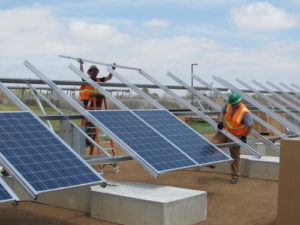 A solar panel collects energy from the sun and converts it into direct current (DC) electricity. Since most homes run on alternating current, you’ll need an inverter to convert this DC electricity to usable AC electricity. Solar panels are best mounted on a roof, where they will face the sun. Ideally, they should be positioned at an angle of 30 to 45 degrees depending on their location. You can either choose a fixed mount that holds the solar panels in place or a track mount that follows the sun throughout the day. Check Solar Providers Near Me – Local Solar
A solar panel collects energy from the sun and converts it into direct current (DC) electricity. Since most homes run on alternating current, you’ll need an inverter to convert this DC electricity to usable AC electricity. Solar panels are best mounted on a roof, where they will face the sun. Ideally, they should be positioned at an angle of 30 to 45 degrees depending on their location. You can either choose a fixed mount that holds the solar panels in place or a track mount that follows the sun throughout the day. Check Solar Providers Near Me – Local Solar
Monocrystalline solar panels are the most efficient. They also cost the most. They’re also known as single-crystal solar panels because they contain one pure silicon crystal. This type of solar panel is dark black. Monocrystalline panels are the most durable and space-efficient, but they come at a cost. You can expect your solar panel to last for at least 25 years.
Solar panels come in a variety of sizes, and they are generally connected in series. They can be connected in parallel if you need to. Some panels are mobile and can be installed on a roof. You can also choose a solar panel that has an optional battery bank. Battery banks will help you survive in the event of power outages.
One important thing to consider is the weather. Although solar panels produce electricity more efficiently in cold weather, they are less efficient in warm weather. A sunny day with low cloud cover will increase the amount of electricity they produce. Cool weather will also make solar panels more efficient. A sunny day in June or July will produce more energy.
A solar panel should be installed in a way that will protect it from the weather elements. A solar panel should be able to withstand hail impact, and the Department of Energy recommends installing solar panels with the highest UL 1703 or UL 61703 rating for wind and snow loading. Different types of solar panels are made from different materials. Silicon is a good choice because it is durable and efficient.
Solar panels can be expensive, but prices have been decreasing over the years. Depending on the location of installation, you can expect to pay between $2 and $3 per watt of energy. However, you should consider whether you can afford to spend that much money on the initial installation. If you can’t afford to buy a solar panel outright, consider leasing it. It’s less expensive, but will not increase the value of your home, and you may not be eligible for incentives.
Solar panels produce DC electricity and convert it to AC electricity. The surplus electricity is then fed back into the grid, and your utility pays you for the extra electricity that you generate. These credits can be used to offset your electric bill in the future. You can also take advantage of the benefits of net metering.